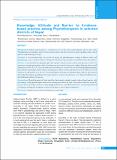Please use this identifier to cite or link to this item:
https://hdl.handle.net/20.500.14356/1388Full metadata record
| DC Field | Value | Language |
|---|---|---|
| dc.contributor.author | Bajracharya, Shristi | - |
| dc.contributor.author | Tharu, Niraj Singh | - |
| dc.contributor.author | Bokalial, Doly | - |
| dc.date.accessioned | 2023-05-09T10:21:06Z | - |
| dc.date.available | 2023-05-09T10:21:06Z | - |
| dc.date.issued | 2019 | - |
| dc.identifier.citation | BajracharyaS., TharuN. S., & BokalialD. (2019). Knowledge, Attitude and Barrier to Evidence-based Practice among Physiotherapists in Selected Districts of Nepal. Journal of Nepal Health Research Council, 17(2), 215-221. https://doi.org/10.33314/jnhrc.v0i0.1711 | en_US |
| dc.identifier.issn | Print ISSN: 1727-5482; Online ISSN: 1999-6217 | - |
| dc.identifier.uri | http://103.69.126.140:8080/handle/20.500.14356/1388 | - |
| dc.description | Original Article | en_US |
| dc.description.abstract | Abstract Background: Evidence-based practice is considered as one of the most accepted practice all over the world. Physiotherapists in Nepal have started evidence-based practice, but there has been no study regarding evidence-based practice in physiotherapy in Nepal. Methods: A cross-sectional study was carried out among 164 physiotherapists working in different clinics and physiotherapy centers of selected districts of Nepal. A self-reported questionnaire was distributed and collected later. Results: It was found that the physiotherapists had a positive attitude towards evidence-based practice with 95.2% agreeing or strongly agreeing that evidence-based practice is necessary forthe practice of physical therapy and an overall total mean score of 34.73(72.35%) out of 48 and an overall mean 2.8 out of 4. It was also found that physiotherapists had moderate knowledge towards evidence-based practice with an overall total mean score of 19.18(68.5%) out of 28 and an overall mean of 2.74 out of 4. It was found that those having a specialization degree had two times greater knowledge than without specialization. The major barriers to evidence-based practice were obtained insufficient time and traditional methods of treatment. Conclusions: Physical therapists of Nepal stated they had a positive attitude towards evidence-based practice with the majority of the physiotherapists interested in learning more about the topic. They believed that they needed to increase the use of evidence in practice. They thought major barrier as insufficient time hence continuous professional development training that incorporate evidence-based practice were of greater importance. Keywords: Attitude; barrier; evidence-based practice; knowledge. | en_US |
| dc.language.iso | en | en_US |
| dc.publisher | Nepal Health Research Council | en_US |
| dc.relation.ispartofseries | Apr-June, 2019;1711 | - |
| dc.subject | Attitude | en_US |
| dc.subject | Barrier | en_US |
| dc.subject | Evidence-based practice | en_US |
| dc.subject | Knowledge | en_US |
| dc.title | Knowledge, Attitude and Barrier to Evidence-based Practice among Physiotherapists in Selected Districts of Nepal | en_US |
| dc.type | Journal Article | en_US |
| local.journal.category | Original Article | - |
| Appears in Collections: | Vol. 17 No. 2 Issue 43 Apr - Jun 2019 | |
Files in This Item:
| File | Description | Size | Format | |
|---|---|---|---|---|
| 1711-Manuscript-10748-1-10-20190804.pdf | Fulltext Download | 462.58 kB | Adobe PDF |  View/Open |
Items in DSpace are protected by copyright, with all rights reserved, unless otherwise indicated.
